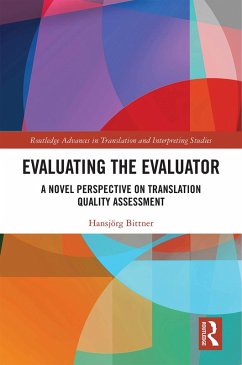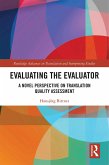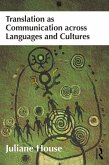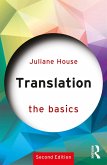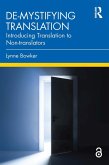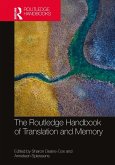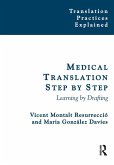Evaluating the Evaluator (eBook, ePUB)
A Novel Perspective on Translation Quality Assessment


Alle Infos zum eBook verschenken

Evaluating the Evaluator (eBook, ePUB)
A Novel Perspective on Translation Quality Assessment
- Format: ePub
- Merkliste
- Auf die Merkliste
- Bewerten Bewerten
- Teilen
- Produkt teilen
- Produkterinnerung
- Produkterinnerung

Hier können Sie sich einloggen

Bitte loggen Sie sich zunächst in Ihr Kundenkonto ein oder registrieren Sie sich bei bücher.de, um das eBook-Abo tolino select nutzen zu können.
This book offers a theoretical framework for assessing translation quality grounded in supportive argumentation. The volume outlines a systematic framework for translators and translation critics to substantiate their decisions and judgments on a translation's quality and in the case of negative criticism, put forward a more effective translation solution. The book traces the decision-making process underpinning translation practice, considering the different factors surrounding a particular translation to inform the most appropriate translation strategy, such as the temporal and geographical…mehr
- Geräte: eReader
- mit Kopierschutz
- eBook Hilfe
![Evaluating the Evaluator (eBook, PDF) Evaluating the Evaluator (eBook, PDF)]() Hansjörg BittnerEvaluating the Evaluator (eBook, PDF)42,95 €
Hansjörg BittnerEvaluating the Evaluator (eBook, PDF)42,95 €![Translation as Communication across Languages and Cultures (eBook, ePUB) Translation as Communication across Languages and Cultures (eBook, ePUB)]() Juliane HouseTranslation as Communication across Languages and Cultures (eBook, ePUB)38,95 €
Juliane HouseTranslation as Communication across Languages and Cultures (eBook, ePUB)38,95 €![Translation: The Basics (eBook, ePUB) Translation: The Basics (eBook, ePUB)]() Juliane HouseTranslation: The Basics (eBook, ePUB)19,95 €
Juliane HouseTranslation: The Basics (eBook, ePUB)19,95 €![Pragmatics in Korean and Japanese Translation (eBook, ePUB) Pragmatics in Korean and Japanese Translation (eBook, ePUB)]() Jieun KiaerPragmatics in Korean and Japanese Translation (eBook, ePUB)38,95 €
Jieun KiaerPragmatics in Korean and Japanese Translation (eBook, ePUB)38,95 €![De-mystifying Translation (eBook, ePUB) De-mystifying Translation (eBook, ePUB)]() Lynne BowkerDe-mystifying Translation (eBook, ePUB)0,00 €
Lynne BowkerDe-mystifying Translation (eBook, ePUB)0,00 €![The Routledge Handbook of Translation and Memory (eBook, ePUB) The Routledge Handbook of Translation and Memory (eBook, ePUB)]() The Routledge Handbook of Translation and Memory (eBook, ePUB)44,95 €
The Routledge Handbook of Translation and Memory (eBook, ePUB)44,95 €![Medical Translation Step by Step (eBook, ePUB) Medical Translation Step by Step (eBook, ePUB)]() Vicent MontaltMedical Translation Step by Step (eBook, ePUB)34,95 €
Vicent MontaltMedical Translation Step by Step (eBook, ePUB)34,95 €-
-
-
Dieser Download kann aus rechtlichen Gründen nur mit Rechnungsadresse in A, B, BG, CY, CZ, D, DK, EW, E, FIN, F, GR, HR, H, IRL, I, LT, L, LR, M, NL, PL, P, R, S, SLO, SK ausgeliefert werden.
- Produktdetails
- Verlag: Taylor & Francis eBooks
- Seitenzahl: 296
- Erscheinungstermin: 28. November 2019
- Englisch
- ISBN-13: 9781000768008
- Artikelnr.: 58331457
- Verlag: Taylor & Francis eBooks
- Seitenzahl: 296
- Erscheinungstermin: 28. November 2019
- Englisch
- ISBN-13: 9781000768008
- Artikelnr.: 58331457
- Herstellerkennzeichnung Die Herstellerinformationen sind derzeit nicht verfügbar.
Introduction
The quality of translation: different approaches
Juliane House
Malcolm Williams
Heidrun Gerzymisch-Arbogast and Klaus Mudersbach
Ernst-August Gutt
Other approaches to translation quality
Approaches to translation quality in the twentieth century
Approaches to translation quality in the twenty-first century
Preliminary assumptions
Defining translation quality and translation quality assessment
Some thoughts on measuring quality
Some thoughts on achieving good quality
Revisiting overt and covert translation
Refining the concept of overt/covert translation: overview
Refining the concept of overt/covert translation: detailed discussion
The problem of subjective evaluation
The problem of subjectivity from a philosophical point of view
The process of translation quality assessment
The problem of subjectivity from a translation studies point of view
How to curb the subjective in translation quality assessment
Towards evaluating the evaluator
Some views on how to evaluate translations
The evaluation of commented translations
Quality factors of translation
The "translator's daffodil"
Underlying assumptions
Factor categories
Source text
Language pairs in translation and source text analysis (Nord)
Sender and sender's intention
Audience and medium
Place and time of communication
Motive for communication and text function
Source text defects
Summary of source text factors
Text form
Intratextual factors
Subject matter and content
Text composition and non-verbal elements
Lexis, syntax, and suprasegmental features
Selected text types
Poetry, drama, and comics
Audiovisual translation
Summary of text form factors
Client
Client roles
Deadlines
Glossaries
Stipulations and specifications
Motivation
Summary of client factors
Translator
Overview and translation tools
Translation competence
Qualification and motivation
Summary of translator factors
Culture
The relativity of culture
Cultural norms
Translation in different cultures at different times in history
Borderline cases: unlikely successes and EU translations
Summary of culture factors
Politics
Power relations
Censorship
More power issues
Politics and the evaluation of translation quality
Summary of politics factors
The principle of argumentation
The need for an argumentative translation quality assessment
The need for translation theory
The need for argumentation in translation
Summary - the need for an argumentative translation quality assessment
Translation decisions
Decision-making and translation
Defining the translation strategy
Summary of the decision-making process in translation
The argumentation process
A theory of dialectical structures
Dialectical structures in translation quality assessment
Examples of argumentation
Criticising the translation of a young adult novel
Criticising the translation of a survey
Evaluating the evaluator
The corpus: examiners' reports of commented translations
Methodology
Looking at formal characteristics
Looking at aspects of translation quality assessment
Source and target
Errors and achievements
Evidence and arguments
Summary of methodological issues
Results
Formal characteristics
Aspects of translation quality assessment
Source and target
Errors and achievements
Evidence and arguments
Summary of results
Conclusion
Introduction
The quality of translation: different approaches
Juliane House
Malcolm Williams
Heidrun Gerzymisch-Arbogast and Klaus Mudersbach
Ernst-August Gutt
Other approaches to translation quality
Approaches to translation quality in the twentieth century
Approaches to translation quality in the twenty-first century
Preliminary assumptions
Defining translation quality and translation quality assessment
Some thoughts on measuring quality
Some thoughts on achieving good quality
Revisiting overt and covert translation
Refining the concept of overt/covert translation: overview
Refining the concept of overt/covert translation: detailed discussion
The problem of subjective evaluation
The problem of subjectivity from a philosophical point of view
The process of translation quality assessment
The problem of subjectivity from a translation studies point of view
How to curb the subjective in translation quality assessment
Towards evaluating the evaluator
Some views on how to evaluate translations
The evaluation of commented translations
Quality factors of translation
The "translator's daffodil"
Underlying assumptions
Factor categories
Source text
Language pairs in translation and source text analysis (Nord)
Sender and sender's intention
Audience and medium
Place and time of communication
Motive for communication and text function
Source text defects
Summary of source text factors
Text form
Intratextual factors
Subject matter and content
Text composition and non-verbal elements
Lexis, syntax, and suprasegmental features
Selected text types
Poetry, drama, and comics
Audiovisual translation
Summary of text form factors
Client
Client roles
Deadlines
Glossaries
Stipulations and specifications
Motivation
Summary of client factors
Translator
Overview and translation tools
Translation competence
Qualification and motivation
Summary of translator factors
Culture
The relativity of culture
Cultural norms
Translation in different cultures at different times in history
Borderline cases: unlikely successes and EU translations
Summary of culture factors
Politics
Power relations
Censorship
More power issues
Politics and the evaluation of translation quality
Summary of politics factors
The principle of argumentation
The need for an argumentative translation quality assessment
The need for translation theory
The need for argumentation in translation
Summary - the need for an argumentative translation quality assessment
Translation decisions
Decision-making and translation
Defining the translation strategy
Summary of the decision-making process in translation
The argumentation process
A theory of dialectical structures
Dialectical structures in translation quality assessment
Examples of argumentation
Criticising the translation of a young adult novel
Criticising the translation of a survey
Evaluating the evaluator
The corpus: examiners' reports of commented translations
Methodology
Looking at formal characteristics
Looking at aspects of translation quality assessment
Source and target
Errors and achievements
Evidence and arguments
Summary of methodological issues
Results
Formal characteristics
Aspects of translation quality assessment
Source and target
Errors and achievements
Evidence and arguments
Summary of results
Conclusion
